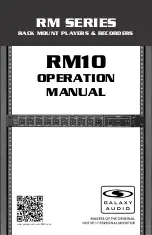
Page 10
rewarded as this adjustment is CRITICAL for performance. The mistake
is often made of over tightening this nut with the result that the music is
deadened.
W A R R A N T Y
We guarantee arms supplied by ourselves to be free from fault for 2 years and
will undertake to correct any faults providing the arm has not been modified
by any party other than ourselves and has not received maltreatment of any
kind. Our OEM arms and modifications are not guaranteed by Rega so
in the event of a warranty claim you should contact ourselves rather than
Rega.
N O T E S
A detailed description of Cartridge set up and care is included in the end
sections of this manual.
Please note that the occasional rewired arm can make a slight
“rustling” noise through the speakers when it is lifted across
the record. This should not be a cause for concern as it is only
caused by microphony of the internal litz cable - under normal
playing conditions this is inaudible.
Check that the arm can move freely across the whole record
– if there is a “catch” then it is almost certain that the curved
arm rest is fouling on the yoke – simply rotate the arm rest till
it no longer fouls – this can be carried out without loosening
the arm rest grub screw.
On the Illustrious and encounter tone-arms you can get a
“gripping” action with the arm rest clip if you rotate it very
slightly so that it is at an angle to the arm ( not too much or
you might get wear on the arm ).
The earth lead should be connected to the earth of your pre-
amplifier or amplifier. This earth lead is best separated slightly
from the arm signal leads so do not wind it around them for
best performance.
Now that all the hard work is over you can settle back and hear the results
- we wish you many hours of enjoyable music and rediscovering your record
collection.
You can increase the height of the lift / lower arm rest by loosening the small
allen screw in the side of the curved arm rest and raising it slightly – finish
by retightening it in position.
The sound of new arms and rewires will improve significantly over the first
2 weeks as items “bed in” and arm wires burn in.
Fit the cartridge to the arm using an alignment gauge and ensure the
headshell wires are bent so that they are clear of the record surface. Ensure
that the bias adjustment slider is set to zero. Set the tracking force to the
manufacturer’s recommendations using a stylus force gauge (stylus balance).
When tightening the counterweight, set it so that the Allen bolt is at the
side of the arm (not at the top) see figure below and tighten firmly - check
tracking force is still correct after tightening.
It is worth experimenting with VTA adjustment if you can. Slightly raise
and lower the arm and then listen - if the sound is bright then the arm is too
high, if it is dull and bass heavy then the arm is too low.
We guarantee arms to be free from fault for 2 years and will undertake to
correct any faults providing the arm has not been modified by any party
other than ourselves and has not received maltreatment of any kind.
NOTE: The Ortofon stylus force gauge works on the same principle as a
set of scales or balances. First, place the stylus on the inscribed line on the
white portion of the scales. Then try the stylus at different points along the
line until you find the point where the white plastic beam “balances” freely
in a roughly level position. You then read the force that is being exerted
- 1gram = 10 mN on the numbered scale, . From this number you can
assess whether you need to increase the tracking force or vica-versa. Move
the tonearm counterweight accordingly and re-measure the tracking force.
Repeat this procedure until the correct tracking force is obtained.
A detailed description of Cartridge set up and care is included in the end
sections of this manual.






























